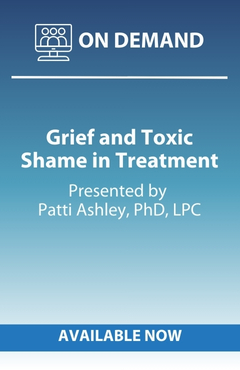Description
This workshop is on-demand, content will be available immediately after purchase.
Footage and all course content (certificate, videos, quiz) will be available until January 20, 2025. Extensions cannot be granted under any circumstances.
Workshop Description:
According to trauma experts such as Peter Levin, Bessel van der Kolk, and Gabor Mate’ trauma isn’t something that happens to you, it is what happens inside you. Trauma changes the brain and nervous system and can tremendously impact relationships and overall well-being. Left unresolved trauma can result in depression, anxiety, fear, rage, addiction, relationship difficulties, and other diagnoses. Additionally, shame often develops alongside of trauma, as clients try to find emotional safety and the ability to love themselves and access self-compassion.
Dr. Patti Ashley combines decades of evidenced based work, neuroscience, polyvagal theory, attachment research, and various treatment modalities to help clients break free from trauma’s grip, and find ways to access emotional safety and authenticity.
This eight-week course will provide clinicians with a deeper understanding of the impact of explicit trauma and the correlating implicit shame in clinical practice. Tools and techniques for effective treatment including person-centered empathy, rescripting, mindfulness, self-compassion, and much more will be explored.


Week One: The Neurobiology of Trauma
- Definitions of Trauma
- Degrees of Trauma
- Body Memories
- Trauma and the Nervous System
- Impact of COVID and Secondary Trauma on the ANS
Week Two: Polyvagal Theory
- The Vagus Nerve
- ANS Hierarchy
- Neuroception
- Co-regulation, Emotional Safety, and Connection
- The Three Therapeutic “R”s
- Repetition, Repetition, Repetition
Week Three: Creating a Safe Environment for Treatment
- Attachment Theory and Trauma
- Creating a Holding Environment
- Identifying Developmental Traumas
- Adverse Childhood Experiences (ACES)
- Therapists as Surrogate Attachment Figures
- Epigenetics and Neuroplasticity
Week Four: The Role of Shame in Healing Trauma
- Defining Shame
- Identifying Implicit Cues to Shame
- The Social Engagement System and Emotional Safety
- Defenses Against Shame
- Strategies of Disconnection
- Shame as an Identify
- Barriers to Relational Presence
Week Five: Empathy in Trauma Treatment
- Person-Centered Therapy
- Empathy as a Right-Brain Activity
- Mirror Neurons
- Four Characteristics of Empathy
- Therapist Self-Assessment
- Four Non-linear Skills
Week Six: Emotional Literacy and Agency
- All Feelings are Okay; All Behavior Isn’t
- Tolerating Discomfort
- Embracing Paradox
- Six Ways to Express Anger
- Functional vs. Familiar Family Systems
- Five Freedoms of Self-Expression
- Emotional Regulation (ABCs, and the Fantastic Five)
- Excavation Exercise
- Connecting the Dots to Early Childhood Trauma and Shame
Week Seven: Treatment Strategies to Reconstruct Emotional Safety
- Genograms, Timelines, and Scripting a New Story
- Writing, Journaling, and Letters
- Creative Arts
- Mythology, Archetypes, and Dreamwork
- Mindfulness, Meditation, Nature, and Animals
- Prosody in Poetry, Music, and Sound
- Yoga, Movement, and Dance
- Laughter and Play
- EMDR, EFT, ACT, Psychedelics, & Brain-spotting
Week Eight: Grief, Loss, Compassion Fatigue, Self-Care, and Q&As
- Trauma and Shame Related to Grief and Loss
- Rhythm, Routine, and Ritual (3 “R”s)
- Permission Slips
- Vulnerability, Humility, Self-awareness, and Courage
- Definition of Love and Belonging
- Support systems
- Self-care, Health, and Fitness
- Healthy Boundaries
- Q&A
Clinical Professionals: All mental health professionals including, but not limited to Clinical Counsellors, Psychologists, Psychotherapists, Social Workers, Nurses, Occupational Therapists, Hospice and Palliative Care Workers, School Counsellors, Youth Workers, Mental Health Workers, Addiction Specialists, Marital & Family Therapists, Speech Language Pathologists, Vocational Rehabilitation Consultants and all professionals looking to enhance their therapeutic skills.
Patti Ashley, Ph.D, LPC, International workshop presenter, author, and psychotherapist, has integrated 40 years of experience in special education, child development, and psychology into her wholehearted work as a psychotherapist, author, international speaker, and authenticity architect coach. She brings unique insights into the identification and treatment of shame, trauma, grief, and dysfunctional family patterns.
Dr. Ashley owns and operates Authenticity Architects in Boulder, Colorado. Her inimitable Authenticity Architects model facilitates long-term changes in the brain and nervous system, helping clients break through unconscious barriers and rediscover a sense of self-love, belonging, and connection.
Patti has counselled a myriad of individuals, couples, families and groups in mental health agencies, psychiatric hospitals, and private practice settings. She also has many years of experience developing continuing education courses for physicians, hospital wellness programs, universities, and other organizations.
Dr. Ashley holds a Doctor of Philosophy Degree in psychology from the Union Institute and University, a Master of Education Degree in early childhood from Old Dominion University, and a Bachelor of Science Degree in special education from James Madison University. She is the author of Living in the Shadow of the Too-Good Mother Archetype (2014), Letters to Freedom (2019), and Shame-Informed Therapy: Treatment Strategies to Overcome Core Shame and Reconstruct the Authentic Self (2020).
For more information, please visit www.pattiashley.com
| Registration | Early bird Fee | Regular Fee |
|---|
| Individual Enrollment | 849.00 | N/A |
| Full-Time Student | 699.00 | N/A |
All fees are per person and in Canadian dollars ($CAD).
For group and/or student rates please view our Terms & Conditions and contact webinars@jackhirose.com for more information and registration.







